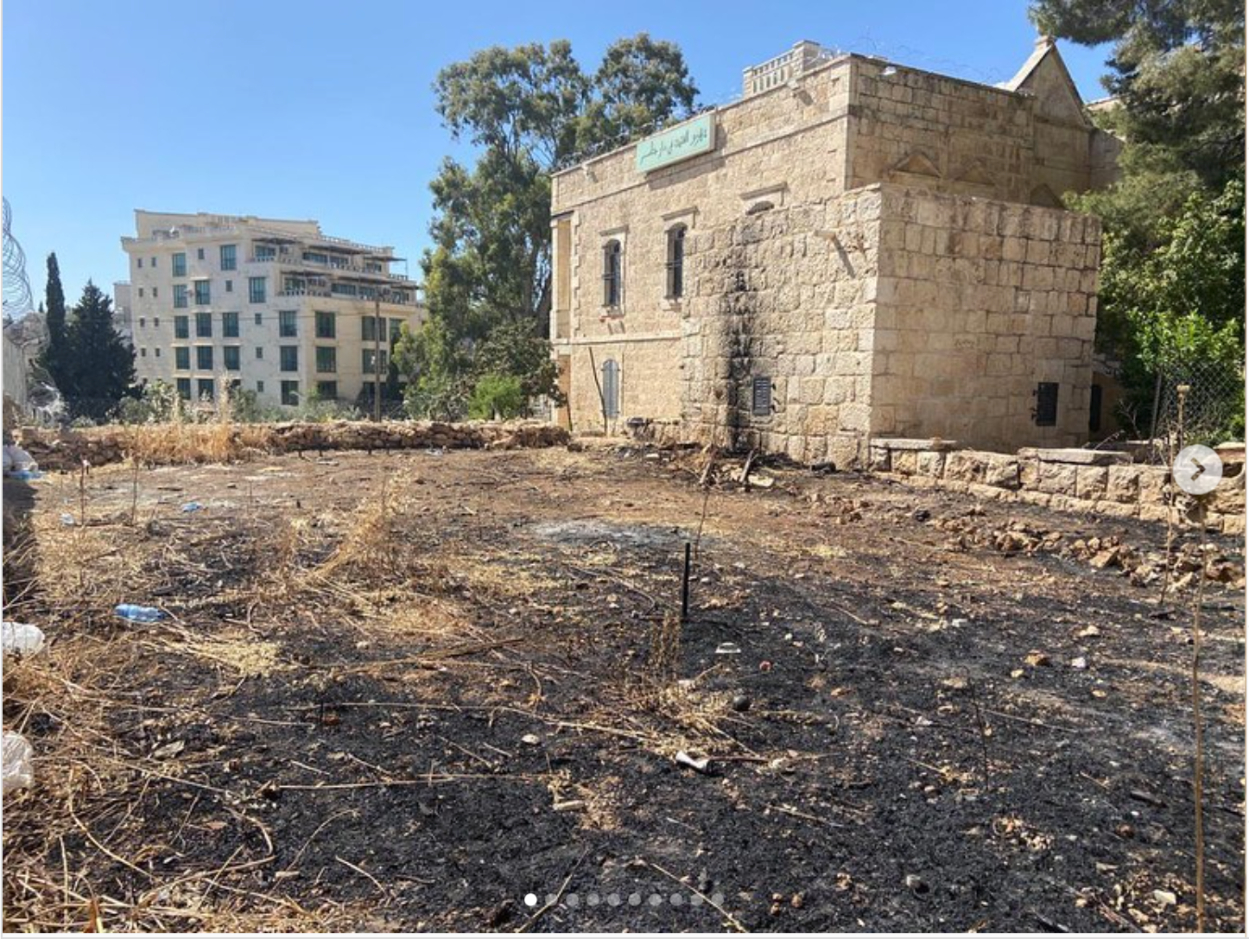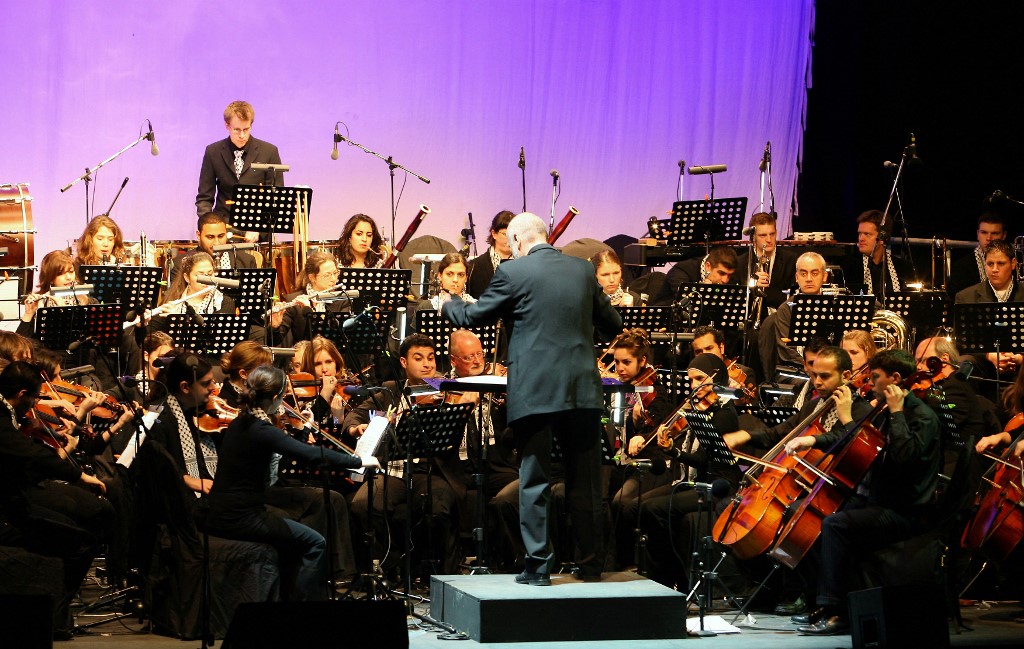“We will rebuild.”
That was the message posted by the Dar Yusuf Nasri Jacir for Art and Research on social media.
The arts centre, founded in Bethlehem in 2014 by Palestinian artist Emily Jacir with her sister, filmmaker Annemarie Jacir, was raided by the Israeli army on 15 May, during a wave of violent repression of Palestinian dissent. The soil of its painstakingly cultivated urban garden scorched; hard drives, computers and camera equipment confiscated.
The centre posted images of tear gas canisters, rubber-coated steel bullets, live ammunition and shards of glass littering the ground.

That same month, Israeli air strikes reduced several bookstores to rubble in the besieged Gaza Strip, during an 11-day offensive on the Palestinian enclave. “It was a dream,” said Shabaan Aslem, as he looked over the ruins of his business, the bookshop Iqraa al-Jadeed, the destruction of which led to an outpouring of international support.
In a statement on 19 May, the Palestinian Authority Ministry of Culture condemned the attacks on cultural and media buildings as being “part of an ongoing Israeli policy to destroy all aspects of life in the country”.
While the damage inflicted by Israeli forces on Palestinian cultural and media centres in May garnered attention abroad, these attacks are nothing new.
The stifling of artistic and cultural expression goes beyond military operations, however, as Palestinian – and Israeli – artists recount the more insidious methods of intimidation and alienation used by the Israeli authorities to silence anti-occupation voices.
‘Loving Beethoven and your country’
From an early age, Suhail Khoury nurtured a deep love for the music of German composer Ludwig van Beethoven. Khoury’s mother would find him conducting Beethoven’s famous Fifth Symphony in front of the gramophone. Alongside his love for music, Khoury, who is now the director of the Edward Said National Conservatory of Music, believes his love of Palestine is what brought armed Israeli forces to his door in occupied East Jerusalem on 22 July 2020. Artists under occupation Read More »
That day, the armed forces raided his home and arrested both Khoury and his wife, Rania Elias, director of the Yabous Cultural Centre, in front of their children. Meanwhile, both cultural institutes led by the couple were ransacked.
When asked why music tuition was so threatening to the Israeli state, Khoury responded with a sardonic smile: “Israel decided to attack culture. We do not pose any threat musically of course.”
For the composer and musician, the threat was a symbolic one. “When we go on stage and play Beethoven in the Concertgebouw in Amsterdam or in the Royal Festival Hall in London, wearing our hattas [a traditional Palestinian scarf also known as a keffiyeh]… and just playing classical music,” he told Middle East Eye.
“To only love Beethoven does not seem to bother the Israeli authorities. To only love your country also does not seem to bother them… But to love your country and act on it by performing Beethoven seems to be dangerous,” Khoury said in a statement following his arrest in 2020.
In 2015, Dareen Tatour came to a similar conclusion. The poet and Palestinian citizen of Israel was arrested in her home at 3am, then sentenced to five months in prison and placed under house arrest for three years for alleged incitement for her poem, Resist, my People, Resist Them, which she had published on Facebook.
Six years later, speaking to MEE, her incredulity is still palpable. “What did I do? I only write what I see, what I feel,” she said.
Tatour says her poetry, which relies on the ambiguity of meaning, was mangled in translation by police in court. She was – perhaps knowingly – misinterpreted.
“I talk in Arabic, I write in Arabic and no-one knows the Arabic language in the court,” she said.
Iced out of Israel’s art scene
When Israeli actor and playwright Einat Weizman posted a selfie wearing a T-shirt emblazoned with the Palestinian flag on her Facebook page during the 2014 war on Gaza, she found herself inundated with rape and death threats on social media. How the world’s oldest masks tell a story of Palestinian dispossession Read More »
“It was really frightening,” she told MEE. “I was afraid to go out in the streets. It was a total shock for me.”
This was the first time Weizman had received such a violent backlash, but her resolve was hardened. “I said okay, I will take this experience and put it on stage.”
The experience spurred her to write and produce her first play, Shame, which featured audio recordings of death threats she’d received. It was the beginning of a body of work dedicated to talking about the occupation.
In 2017, her play Prisoners of the Occupation was banned from the Acre Theatre Festival, causing an uproar within the theatre community. Miri Regev, Israel’s then-minister of culture, accused Weizman of “glorifying terrorists with blood on their hands”.
When Regev took office in 2015, she had threatened to cut funding to any “tight assed, hypocritical and ungrateful” artists that “defamed” the state of Israel. In 2017, she proposed a “loyalty to culture” bill, which would have slashed funding to cultural institutions critical of Israel.
The bill did not pass, but for artists like Weizman, getting funding for work is a near impossible task. It took two years to finance Prisoners of the Occupation.
“I do feel lonely,” the playwright said. Held at arm’s length by other artists and starved of funding, Weizman’s efforts to unite her politics and her art have left her an outcast. “The artistic community in Tel Aviv are in solidarity with me, but I will never receive funds to do my art,” she said. “I just continue to do what I need to do, but it is very difficult.”
She is in no doubt as to why. “They know the power of art,” Weizman told MEE. “Art has the ability to produce narratives and enter the hearts and the minds of the audience.”

Hip-hop group DAM, composed of Palestinian citizens of Israel from the town of Lod, concur.
DAM started out rapping in Hebrew in the late 90s, but switched to Arabic in the wake of the Second Intifada.
“We felt that on the other side, no one was listening… so we found our power and our strength in our mother language,” founding member Mahmood Jrere told MEE. “We saw how we all lived under occupation and we had to speak up about it.”
Although they had often performed alongside Israeli hip-hop groups, DAM found themselves excluded from Israeli media coverage and the country’s hip-hop scene. “It was very obvious to us how we were being treated,” Jrere said. https://www.youtube.com/embed/PQrQMOZI9uI?list=PL5E66CB4474FE03C3&enablejsapi=1&origin=https%3A%2F%2Fwww.middleeasteye.net
“Israelis don’t have a problem when you sing about how life is good… but the second a Palestinian goes on stage and sings about, ‘Yo, my life sucks because of the practices of the government,’ then everyone will tell you, ‘Stop, stop, don’t talk about that’.”
Art as resilience
Despite the hardships, for many Palestinian artists, resilience passes through the concept of sumud, or steadfastness.
While artists may not be able to fight off military raids or dismantle occupation policies on their own, those who spoke with MEE said their work served as a record and expression of Palestinian selfhood, in spite of the risks involved.
For Aslem in Gaza, his bookshop was not just a business but a repository for memory, a bolthole for Palestinian identity. But before the dust had settled on its ruins, a crowdfunding campaign to rebuild it sprang up. Dar Jacir met a similar outpouring of support.
The steadfastness could also be seen in Maryam Afifi, a cellist and former pupil of Khoury’s, who was caught smiling at the camera while on her knees in handcuffs after being arrested by Israeli forces during protests in East Jerusalem’s Sheikh Jarrah on 8 May.
For Dareen Tatour, sumud is the written word, whose meaning can be twisted but remains indelible on her social media pages. “I have only this,” she told MEE.
